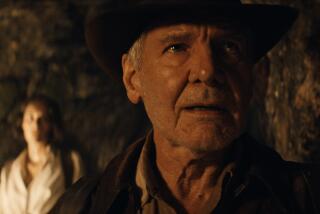Eerie Cult Classic ‘Incubus’ Returns After Lengthy Exile
- Share via
Fox Lorber Home Video’s release of Leslie Stevens’ “Incubus” may at last lift a curse that seems to have bedeviled this 1965 one-of-a-kind supernatural thriller.
“Incubus” has attained mythic status among horror movie buffs, cult film aficionados and, of course, the French. It never received theatrical distribution in this country and for years was thought to have been lost until a print was located in France, the only country where the film received a theatrical run.
Plucked from obscurity, “Incubus” is of further interest because it stars a pre-”Star Trek” William Shatner and was photographed by two-time Academy Award winner Conrad Hall, with assists by Charles Rosher and Oscar-nominee William Fraker.
And oh, yes, one other thing: The dialogue is spoken in Esperanto, a language that was invented in the 19th century in hopes that it would become planet Earth’s universal tongue.
Fox Lorber released “Incubus” on Tuesday in VHS ($20) and DVD ($25) editions. The DVD features an interview segment with producer Anthony Taylor, Hall and Fraker. Shatner provides a tongue-in-cheek commentary (at one point, he claims that “Star Trek” also was intended to be spoken in Esperanto).
Stark and eerie, “Incubus” is set in a seaside village, where an ancient well’s healing waters attract “the vain and the corrupt as well as the infirm.” Allyson Ames, who later married Stevens, stars as Kia, a succubus fed up with harvesting “evil, ugly souls” for Incubus, the God of Darkness. Ignoring her sister’s warnings, she is determined to lure “a noble soul” and become “the Beast God’s best daughter.” Enter Shatner’s Marc, an incorruptible soldier, with whom she instead falls in love--with horrific consequences.
The question that first comes to mind is: Esperanto? “Strangely enough, it didn’t seem that big a deal,” producer Taylor recalled with a laugh during a phone interview. “In retrospect, it seems more so. If the film wasn’t going into the drive-ins, we felt our best chance would be getting it into an art house, where the audience would accept the idea of having another language and subtitles.”
“Incubus” was filmed in two weeks, primarily in Big Sur. Hall--who spoke from Chicago, where he is photographing Sam Mendes’ “The Road to Perdition”--called “Incubus” and “The Outer Limits,” on which he and Stevens first collaborated, the greatest technical challenges of his then-fledgling career.
“Leslie [who also wrote the script] described it to me as an odd kind of occult film,” Hall said. “He wanted it bizarrely lit and visualized. I’m somebody who loves writers, and the film’s look is pretty much described in the script. And so you use the visual language to translate the academic language. You just really wail and make it into something otherworldly. We stayed at the Big Sur Inn, and we shot all over the area--by the seashore, the valley, the streams, all manner of places.”
Despite glowing reviews on the film festival circuit, “Incubus” was a hard sell. “You can imagine,” Taylor said. “Everyone else had gone on to other projects, and I’m back in New York [talking to distributors]. They didn’t exactly call 911 and ask for me to be taken away, but they looked at me that way.”
This was just the beginning of the troubles that would plague “Incubus.” Call it the “Incubus” curse; it cast a dark shadow not just on the film itself, but also on several of its stars.
It manifested itself early at the film’s premiere at the San Francisco Film Festival (which was attended by Roman Polanski and Sharon Tate). The print of the film was missing its soundtrack. Taylor was able to substitute another that was being screened for critics.
Without even a poster to mark its existence, “Incubus” drifted into obscurity. The film’s negative and prints were stored at a Hollywood lab. In 1993, Taylor, considering a resurrection of “Incubus” for video release, was shocked to learn that the lab had lost or destroyed all the materials.
“It was heartbreaking,” he said. “I had almost forgotten about it, and I didn’t know how much potential it had, frankly, but I didn’t like the idea of somebody’s work being destroyed.” Taylor sued and reached a settlement with the lab.
Three years later, Taylor received a call from friend and agent Howard Rubin in France. A print of “Incubus” had been located in the Cinematheque Francaise archives.
Efforts to get hold of it were stymied by the Cinematheque’s insistence that a local film archive vouch for Taylor. Neither the Academy of Motion Picture Arts and Sciences nor the American Film Institute would help, according to Taylor. “Six months later, I called UCLA. A guy there said, ‘What do I have to do?’ The next day, we were all set.”
Thus began a painstaking restoration process. “The film had been playing [in France] to packed audiences for 20 years,” Taylor said. “The print was completely worn out. All the perforations were torn. A frame-by-frame optical negative had to be created. Then, I couldn’t get it out of the country because the film was considered a French national treasure.”
Eventually he got his negative and the Sci-Fi Channel funded further restoration and the creation of a 35-millimeter print, which may go into limited art-house release.
Good fortune is not often associated with “Incubus.” Several of its stars met with tragic ends. In 1966, Milos Milos, a Yugoslavian actor, murdered Barbara Ann Thompson, Mickey Rooney’s estranged fifth wife, and then killed himself.
Ann Atmar, who co-stars as Marc’s sister, committed suicide soon after completion of the film. The daughter of Eloise Hardt, who portrayed Kia’s sister, was kidnapped and murdered. The film’s music editor, Dominic Frontiere, was sent to prison after scalping Super Bowl tickets. And Daystar Productions, Stevens’ independent production company, went into bankruptcy. (Stevens passed away in 1998.)
Taylor is gratified that the film’s time seems finally to have come. “Times have changed so much that people really appreciate other kinds of films,” he observed. “So I guess they’ll be ready for ‘Incubus 2.’ ”
More to Read
The biggest entertainment stories
Get our big stories about Hollywood, film, television, music, arts, culture and more right in your inbox as soon as they publish.
You may occasionally receive promotional content from the Los Angeles Times.










